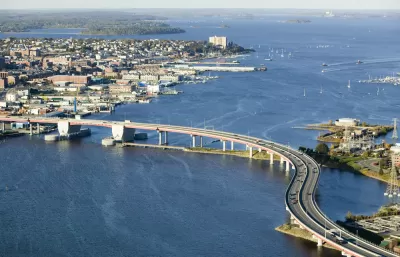Can one small port city make a difference? South Portland, home to an oil tanker facility that has long received crude from abroad, has blocked the owner from exporting tar sands crude and hopes to spur other cities to act.

The city council of South Portland (pop. 25,000) voted 6-1 on July 21 to pass the Clear Skies Ordinance [PDF] that "prohibits the bulk loading of crude oil onto marine tank vessels," said Mayor Jerry Jalbert. Susan Sharon, deputy news director of Maine Public Broadcasting, reports on the story for NPR in addition to MPBN.
Residents are concerned about air pollution, the possibility of a spill and the difficulty of cleaning up a heavier, more toxic form of crude oil, (Jalbert) says. It's that confluence of concerns that moved the council to ban tar sands.
The ordinance had widespread support from city residents. "Nearly 300 people came to the city’s community center Monday night to support the vote," writes The Hill's Timothy Cama.
The ordinance affects the operations of the Portland Montreal Pipeline Corp. that "owns and operates a tanker unloading facility, two tank farms (South Portland, Maine and Montreal, Quebec) and a system of pump stations and crude oil pipelines that traverse 236 miles along a common right-of-way from the state of Maine to Quebec," writes Sharon.
Pipeline company officials say they are evaluating their legal options. They say the ordinance restricts their ability to adapt to a changing market and to meet the energy needs of the region.
The proposed reversal of pipeline flows mirrors what's happening elsewhere as a result of the energy boom in North America due to fracking and oils sands production. Pipelines have already been reversed along the Gulf Coast between Cushing, Oka. and Houston. Costly liquified natural gas (LNG) terminals proposed to import natural gas for utilities now are being considered to export natural gas.
Sharon writes in MPBN that "(e)nvironmentalists are calling passage of the ordinance historic, something that could galvanize other community activists. But the pipeline company is characterizing it as "illegal" and considering its next move."
"This ordinance, if passed, would clearly be pre-empted by federal and state law," warned Matt Manahan, an attorney for the Portland Montreal Pipe Line Corp. before the vote. "There can be no doubt about that, and it's a mistake to move forward with an illegal ordinance."
"That hasn't discouraged Dylan Voorhees, the Clean Energy and Global Warming Project director at the Natural Resources Council of Maine. He says what has happened in South Portland is galvanizing activists around the country and motivating them to raise awareness about the threat of tar sands," writes Sharon.
FULL STORY: Maine City Council Votes To Keep Tar Sands Out Of Its Port

Alabama: Trump Terminates Settlements for Black Communities Harmed By Raw Sewage
Trump deemed the landmark civil rights agreement “illegal DEI and environmental justice policy.”

Study: Maui’s Plan to Convert Vacation Rentals to Long-Term Housing Could Cause Nearly $1 Billion Economic Loss
The plan would reduce visitor accommodation by 25% resulting in 1,900 jobs lost.

Why Should We Subsidize Public Transportation?
Many public transit agencies face financial stress due to rising costs, declining fare revenue, and declining subsidies. Transit advocates must provide a strong business case for increasing public transit funding.

Paris Bike Boom Leads to Steep Drop in Air Pollution
The French city’s air quality has improved dramatically in the past 20 years, coinciding with a growth in cycling.

Why Housing Costs More to Build in California Than in Texas
Hard costs like labor and materials combined with ‘soft’ costs such as permitting make building in the San Francisco Bay Area almost three times as costly as in Texas cities.

San Diego County Sees a Rise in Urban Coyotes
San Diego County experiences a rise in urban coyotes, as sightings become prevalent throughout its urban neighbourhoods and surrounding areas.
Urban Design for Planners 1: Software Tools
This six-course series explores essential urban design concepts using open source software and equips planners with the tools they need to participate fully in the urban design process.
Planning for Universal Design
Learn the tools for implementing Universal Design in planning regulations.
Smith Gee Studio
Alamo Area Metropolitan Planning Organization
City of Santa Clarita
Institute for Housing and Urban Development Studies (IHS)
City of Grandview
Harvard GSD Executive Education
Toledo-Lucas County Plan Commissions
Salt Lake City
NYU Wagner Graduate School of Public Service


























